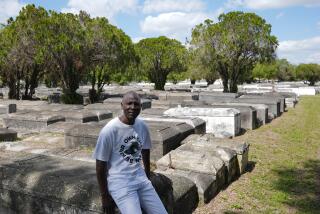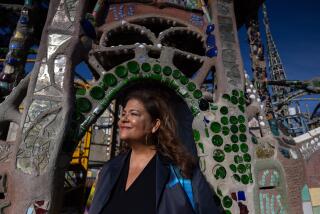Robert DeForrest, 72; identified black historic landmarks
- Share via
Robert DeForrest, co-founder and president of a historic preservation institute that worked to locate landmarks throughout the United States that reflected African American history and culture, died of aspiration pneumonia Feb. 23 at George Washington University in Washington, D.C. He was 72.
In 1970, DeForrest and his brother, Vincent, established what became the Afro-American Institute for Historic Preservation and Community Development in Washington. For 18 years, working with the U.S. Department of the Interior, the National Park Service, the Department of Housing and Urban Development, and the Historic American Buildings Survey, the institute conducted national studies that led to more than 60 sites in 22 states and the District of Columbia being designated national historic landmarks.
In 1978, working with the park service and at the urging of a panel of 20 leading African American history scholars, the DeForrests completed a study that resulted in the Richmond, Va., home of Maggie Walker, a pioneering black banker and civic leader, being named a historic landmark. It was the first time a black woman had been so recognized by the National Park System.
DeForrest and his brother formed their organization in anticipation of the 1976 U.S. bicentennial celebrations. Then called the Afro-American Bicentennial Corp., it worked with the park service to host reenactments of Frederick Douglass’ famous Fourth of July speech.
Crowds filled the grounds of the Douglass home in Southeast Washington to hear actor James Earl Jones deliver the oration in 1973, and in subsequent years they packed the Concert Hall at the John F. Kennedy Center for the Performing Arts.
Preserving history and knowing one’s roots were important to DeForrest, who grew up as a ward of the state in his native Cleveland after his mother died when he was a year old.
“The history we were taught in school always came from a Eurocentric perspective,” DeForrest said in a 1989 Washington Post article. “But the presence of blacks in American history is very significant, from the Revolutionary War to Vietnam.”
After serving in the Army in Germany, DeForrest went to Washington in 1967 and worked for several community action agencies. He was also a personnel manager for a health program.
After a mild heart attack and a series of strokes, DeForrest retired in the late 1980s.
More to Read
The biggest entertainment stories
Get our big stories about Hollywood, film, television, music, arts, culture and more right in your inbox as soon as they publish.
You may occasionally receive promotional content from the Los Angeles Times.










